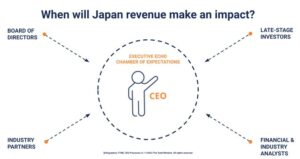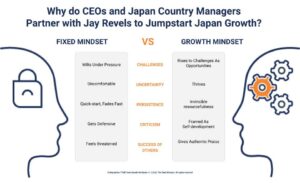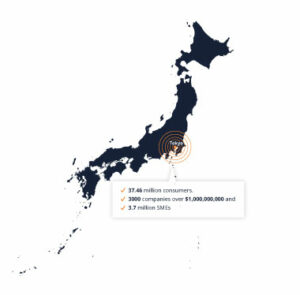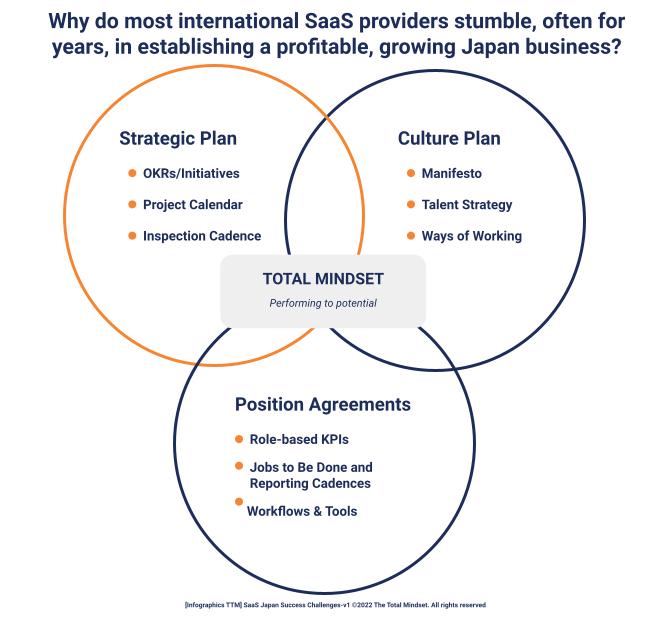In our work with international software firms, including direct experience in cold-start APAC and Japan office creation, we have a combination of the following factors that contribute to success in Japan:
- Hiring the right country manager with effective support from headquarters and in-country resources
- Cultivating A-level teams with effective
• Lead generation and brand building through events and partnerships;
• Sales enablement systems and content for making strong and personalized business cases, change management plans, etc.;
• Rapid ideation with solution prototyping labs and integration partnerships;
• Guided and peer-to-peer onboarding processes with effective video content; and
• In-app personalization and continuous upskilling (cornerstone for Product-led Growth).
- Maintaining a relentless focus on customer success with twin aim of retention and active referrals
- Operationalizing an always-be-recruiting pipeline for talent and partners
All necessary, but still insufficient
We have found the most important and most daunting success factor is co-ownership within and throughout the country team of the following:
- Strategic plan with objectives and key results broken down to individual teams and weekly leading measures or KPIs
- Culture plan with powerful and memorable business narratives that animate a shared greater purpose, vision or future proofs, values in actions, regular inspection and reporting with interactive scorecards and role-specific KPI dashboards
- Performance plans personalized to team and individuals, harmonizing life and career goals, ways of working as a member of high-performing teams, and workspaces.
High-impact contributors who meet or exceed goals express co-ownership as “I own the company. The company owns me.”
The hard problem that TTM solves is the development of accurate revenue forecasts from localized products and solutions for Japanese customers.
The lack of strong confidence in a country manager’s ability to develop a business case for localized products and the development of data-driven argument compounds the problem of accurate revenue forecasts.
A very expensive and effective way to circumvent this problem is to create a joint venture with a local business organization, leaving North American executives out of the loop of where and how to localize the product….it’s the job of the Joint Venture’s managing director to prioritize and allocate local resources.
Upon hitting agreed upon success metrics, the international software company buys out its partners shares in the joint ventures, paying $10s to 100s of millions of dollars as a consequence.
TTM POINT OF VIEW
Solving this problem starts with placing the right country manager in charge of building the Japanese market and then coaching this leader in developing a localization plan in a business case to fund it.
The hard work that takes “local knowledge” is forecasting future revenues from a phased introduction of needed localized functions and related services. As your Japanese market partner, TTM provides and interactive dashboard, integrating qualitative and quantitative data sales pipeline, product usage, transaction data, interviews, and qualitative feedback from prototyping labs. Your executive dashboard summarizes current and projected pipeline revenues from direct sales, partners, and phased localized versions of products.
Lack of Confidence Often Arises From English as a Second Language and Cultural Norms Associated with Blunt Communications
Companies are often encumbered by weak direct sales capabilities, ineffective value selling to CxOs and an overdependence on resellers as well as highly procedural PR and marketing.
Companies often lack visibility into their local operations other than through their country manager. Many companies fail to gain market traction after years of trying on their own.






